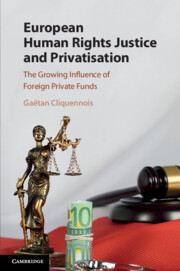Book contents
- European Human Rights Justice and Privatisation
- European Human Rights Justice and Privatisation
- Copyright page
- Contents
- Tables
- Foreword
- Acknowledgments
- Introduction
- Part I The Procedural Aspect of the Growing Influence of Private Foundations on the European Human Rights Justice System
- 1 The Increasing Influence of Private Foundations in the Realm of Justice
- 2 The Creeping Private Influence on the Inputs of the ECtHR and the CJEU
- 3 The Influence of Private Foundations on the Outputs of the ECtHR and the CJEU
- 4 The Growing Influence Exerted by the Private Sector on the Reform and Structure of the ECtHR and the CJEU
- Part II The Substantive Dimension of the Growing Influence of Private Foundations on European Human Rights Justice
- Conclusion: Towards a Privatised Capture of Human Rights?
- Select Bibliography
- Index of Authors
- General Index
2 - The Creeping Private Influence on the Inputs of the ECtHR and the CJEU
from Part I - The Procedural Aspect of the Growing Influence of Private Foundations on the European Human Rights Justice System
Published online by Cambridge University Press: 06 October 2020
- European Human Rights Justice and Privatisation
- European Human Rights Justice and Privatisation
- Copyright page
- Contents
- Tables
- Foreword
- Acknowledgments
- Introduction
- Part I The Procedural Aspect of the Growing Influence of Private Foundations on the European Human Rights Justice System
- 1 The Increasing Influence of Private Foundations in the Realm of Justice
- 2 The Creeping Private Influence on the Inputs of the ECtHR and the CJEU
- 3 The Influence of Private Foundations on the Outputs of the ECtHR and the CJEU
- 4 The Growing Influence Exerted by the Private Sector on the Reform and Structure of the ECtHR and the CJEU
- Part II The Substantive Dimension of the Growing Influence of Private Foundations on European Human Rights Justice
- Conclusion: Towards a Privatised Capture of Human Rights?
- Select Bibliography
- Index of Authors
- General Index
Summary
We analyse the creeping private power on the inputs of the European Courts: the growing participation of private donors in the litigation processes that they undertake, fund and support. We present the main private litigation teams, including that created by the Open Society Foundations and the sources of their funding, and we analyse the litigation documents brought by private foundations and NGOs backed by private donors over twenty years (before and after the economic downturn). We show that litigation activities undertaken by private foundations and those carried out by the most important NGOs before the European Courts are fully funded and supported by a limited roster of foreign private donors. In their litigation activities, NGOs are not only financed by private foundations but also by a mixture of public-private actors. The funding of inputs is indeed backed by certain member states (including the Netherlands, the United Kingdom, Sweden, Norway and Switzerland), which participate in this co-funding through their embassies. Private funding of litigation has an impact not only on the inputs but also on the outputs of the ECtHR and the CJEU.
- Type
- Chapter
- Information
- European Human Rights Justice and PrivatisationThe Growing Influence of Foreign Private Funds, pp. 33 - 65Publisher: Cambridge University PressPrint publication year: 2020



